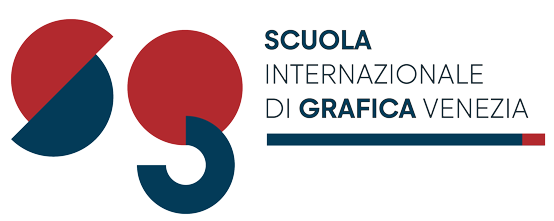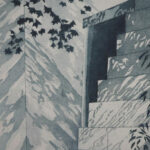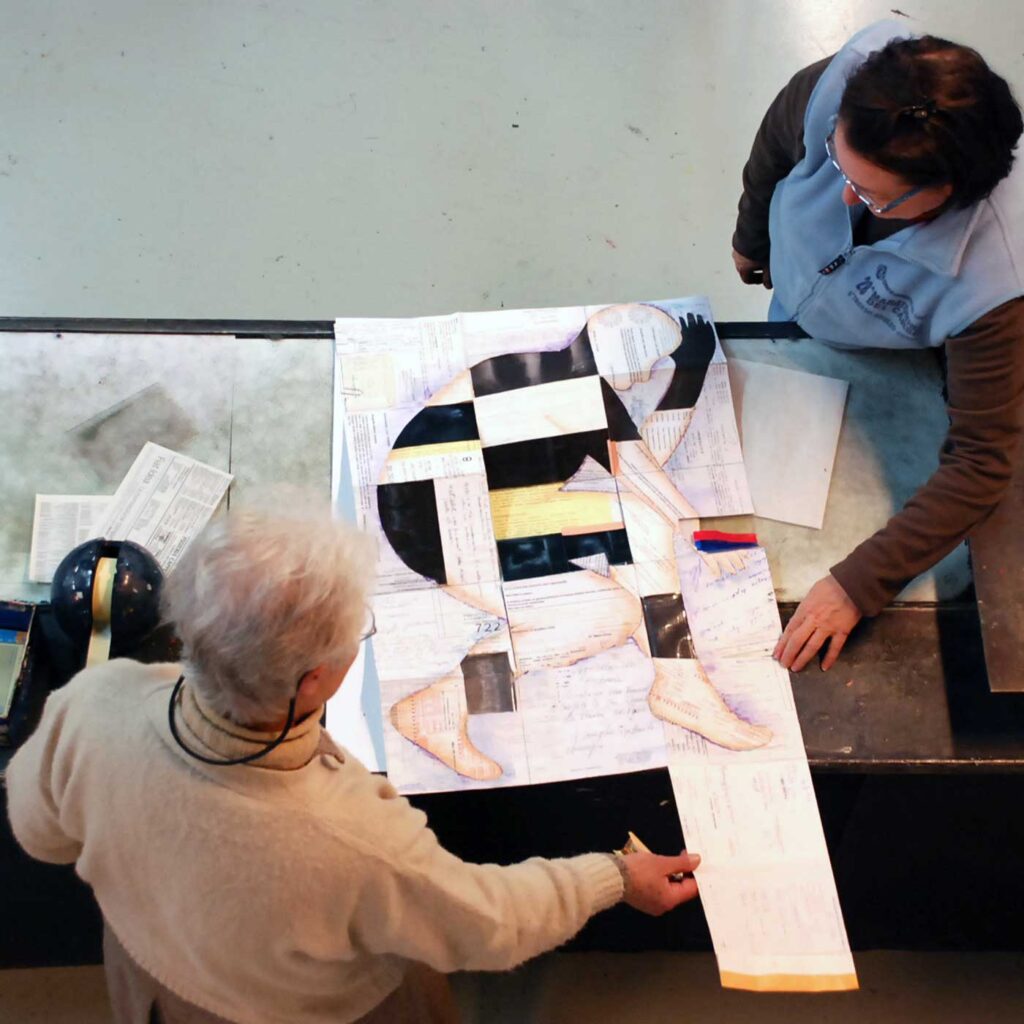
Erasmus+ for teachers - KA1 - professional developement programme
Erasmus plus one to one
Dates open subject to availability
This Programme is recommended for Art teachers and laboratory technicians of all schools
Erasmus + 1 to 1 is the result of 10 years of experience with art teachers from all over Europe who have spent an intense week of work, learning, and exchange in our printmaking studio, well-known and appreciated in the printmaking world.
In the unique atmosphere of Venice, within the professional and equipped spaces of the Scuola, you will be able to approach new sustainable processes and acquire new skills for your vocation as an educator.
Erasmus plus one to one
Programme Outline
- This programme is open to individual participants or small groups with a maximum of three attendees.
- It is possible to choose between two durations: 1-week and 2-week. Dates are open subject to availability.
The 1-week, 40-hour programme includes tutorials on sustainable printmaking and the creation of four prints obtained through different processes. The participant will work under the supervision of our instructors, also asssisting in the daily tasks involved in running a sustainable print-shop.
The 2-week, 80-hour programme includes tutorials on sustainable printmaking, artist’s book, and bookbinding, followed by the creation of five prints obtained through different processes. These works will be subsequently bound in the form of an artist’s book. In this case as well, the participant will work under the supervision of our instructors. Additionally, she/he will assist in the daily tasks involved in running a sustainable print-shop.
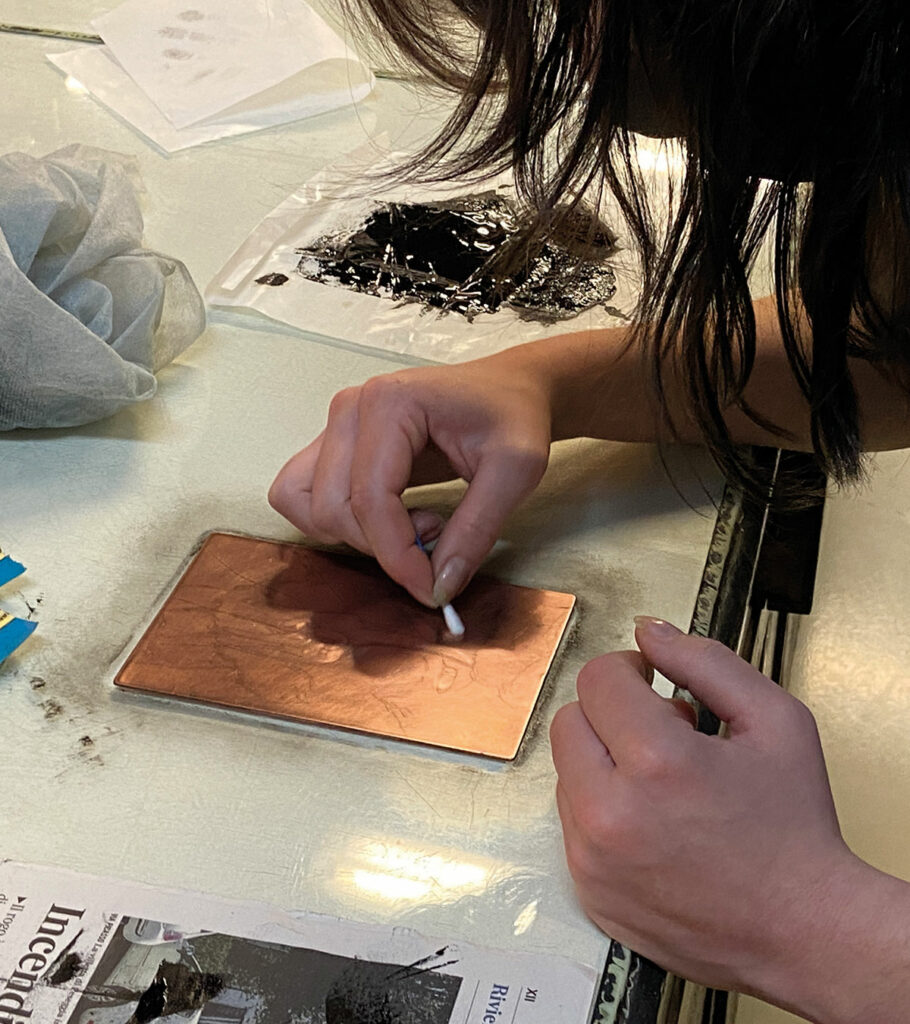
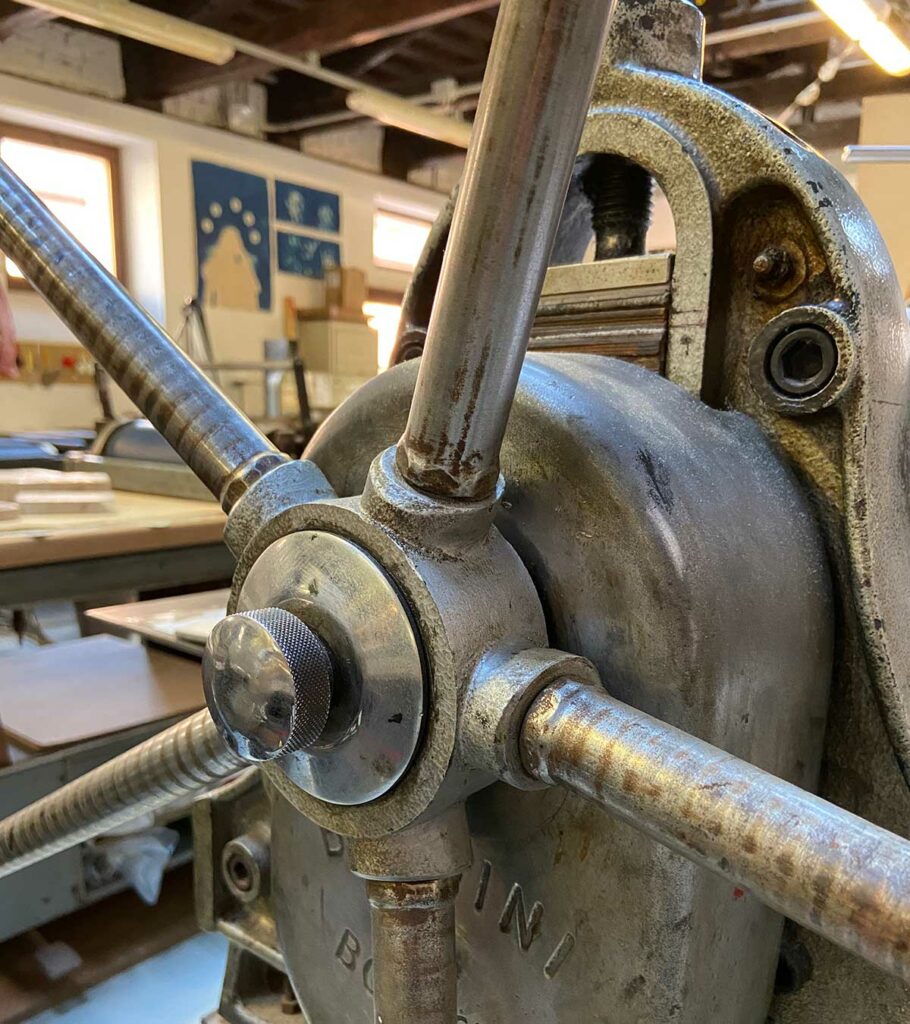
Erasmus plus one to one
Learning Outcomes
The objective of this programme is to familiarize art teachers as well as laboratory technicians from all schools with the use of sustainable materials and the organisation of a contemporary print-studio.
Sustainability in art practice extends beyond the elimination of harmful products; it includes conservation and recycling practices that should be prioritized in both the creative field and beyond.
Participants will gain:
- Knowledge of alternative products to solvents, toxic inks, and varnishes.
- Understanding of alternative processes to traditional methods, incorporating the use of environmentally friendly materials.
- Familiarity with the organization and safety measures in a sustainable print studio.
- Access to artists’ book and bookbinding techniques.
Erasmus plus one to one
Our Teaching Methods
At the Scuola, there is always a harmonious balance between theory and practice. Since the techniques we teach are the result of centuries of research and experimentation, manual activity is preceded by an introduction that allows understanding within its historical, economic, and social context.
The lessons are further supported by visits to museums, libraries, and print collections. Examples provided by our collection of prints and artists’ books also contribute to the learning experience.
Our goal is to obtain tangible results. Participants conclude their educational journey by creating artworks that they will keep.
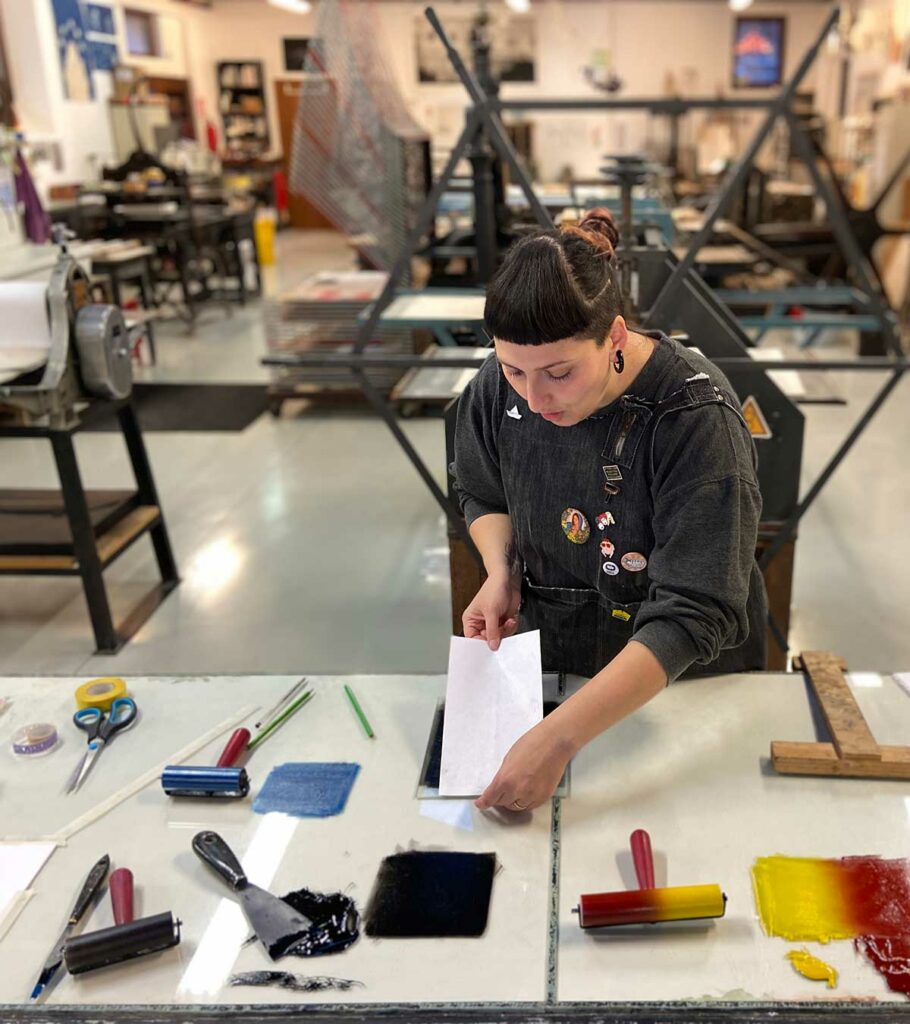
Feedback from our past participants
More Information
Scuola Internazionale di Grafica OID
E10011003
Educators, trainers, school administrators, and other personnel from educational institutions are qualified to receive an Erasmus+ grant, which caters to all costs related to participation in our training courses. This inclusive grant encompasses travel, accommodations, meals, cultural activities, and all associated fees.
Our training courses for teaching and non-teaching staff fall under Key Action 1 (KA121-SCH and KA121-SCH in the field of school education, KA121-ADU and KA122-ADU in the field of adult education, KA121-VET and KA122-VET in the field of technical and vocational education and training)
Program Fees per participant amount to
1-Week – 40-hour Programme €1.200,00
2-Week- 80-hour Programme €1.800,00
- Registration Fee
€200,00
Due upon Course confirmation by the Scuola - Balance Fee
€1.000,00 (1-Week programme) - €1.600,00 (2-Week programme)
Due 30 days prior to the commencement of the Programme
Payment Method
- Bank Transfer:
Beneficiary: Scuola Internazionale di Grafica
Banca della Marca Credito Cooperativo – San Marco 4403, 30124 Venice, Italy
IBAN – IT89A0708402005000000700651
SWIFT: ICRAITRRU40 - Online credit card:
https://shop.scuolagrafica.it/payments/
Fees include all materials needed for the hands-on workshops
Fees do not include
- Accommodation in Venice
- Meals
- Travel costs
- Local transportation costs
- Museum tickets (if not part of the course)
The working hours are from 09:00 to 13:00 and from 14:00 to 18:00, from Monday to Friday. As the participants will receive the keys to the Scuola, the studio is available for independent work on Saturday and Sunday.
Schedule
On the first day, the participants are welcomed to the Scuola and guided by our staff for a tour of the premises. After the tour, our team will showcase significant samples from the Scuola’s collection of prints and artists’ books.
Following this introduction, the tutorials will commence, held every morning and lasting for two or three hours, depending on the techniques covered. The rest of the morning and afternoons will be dedicated to individual work. At the end of each day, the participants will tidy up the workspaces, gaining a practical experience in the daily management tasks of the studio.
The programme includes the following techniques
- Drypoint
- Hard Ground Etching
- Aquatint
- Soft Ground Etching
Drypoint on Plexiglass
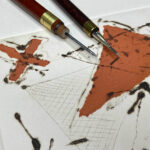
In this day dedicated to the drypoint non-acid technique, we will engrave on a plexiglass plate to learn a versatile and contemporary process. You will use traditional tools such as the needle and more experimental materials such as sandpaper, among others. The different pressure exercised in the engraving will create the ‘beards’ that characterise the drypoint marks. We have revisited an ancient process in a modern and sustainable key thanks to the use of plexiglass plates and soy oil-based inks, which are washable with water and soap.
Hard Ground Etching
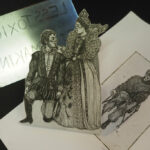
Etching is among the most famous and fascinating indirect engraving techniques, created with the use of mordants to generate engraved signs. This workshop aims to present this ancient process in a contemporary and sustainable perspective.
Our instructor will guide you to process the zinc plates, from the polishing and bevelling to the application of the BIG paint, and finally, to the completion of the hardground etch and print. Eventually you will complete the etching with a blue salt, utilise a mordant classified as less toxic.
Aquatint
Aquatint is an important intaglio technique that allows the creation of areas from different tones in the engraving. It can be achieved with various methods: in this workshop we will approach the most sustainable ones.
During the tutorial we will explore the options that will allow us to refrain from the use of rosin, a highly toxic and volatile powder.
We will engrave zinc matrices with copper suplhate, a saline mordant, protecting the areas not to be engraved with acrylic paint and other products whose performance and sustainability we will analyze.
Soft Ground Etching
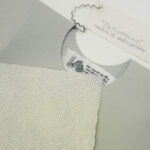
Soft Ground is the intaglio technique that provides us with the softness of the sign in print in pencil, and allows us to imprint textures and various materials on the surface of the metal plate.
In this working day we will discover BIG ground, a substitute for the traditional process of softground.
We will compare the results of different paints, analizing the limits and innovative advantages that contemporary products offer us.
The metal matrices will be etched with copper sulphate, a saline mordant that can replace the traditional acids used for these processes.
Print Day
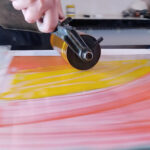
The final day will be dedicated to printing, to the creation of an edition folder and to a final critique.
You will be introduced to different printing techniques, in the creation of the matrices as well as in the many possibilities of printing the plates.
There will be a demonstration of poupée printing, chine-collée printing, printing with two or more plates (double stroke) and a specific study on Akua sustainable inks.
The working hours are from 09:00 to 13:00 and from 14:00 to 18:00, from Monday to Friday. As the participant will receive the keys to the Scuola, the studio is available for independent work on Saturday and Sunday.
Schedule: Week 1
On the first day, the participant is welcomed to the Scuola and guided by our staff for a tour of the premises. After the tour, our team will showcase significant samples from the Scuola’s collection of prints and artists’ books.
Following this introduction, individual tutorials will commence, held every morning and lasting for two or three hours, depending on the techniques covered. The rest of the morning and afternoons will be dedicated to individual work. At the end of each day, the participant will tidy up the workspaces, gaining a practical experience in the daily management tasks of the studio.
The programme of week 1 includes the following techniques
- Hard Ground Etching
- Aquatint
- Soft Ground Etching
- Burnished Aquatint
- Photoetching with BIG groud
Hard Ground Etching

Etching is among the most famous and fascinating indirect engraving techniques, created with the use of mordants to generate engraved signs. This workshop aims to present this ancient process in a contemporary and sustainable perspective.
Our instructor will guide you to process the zinc plates, from the polishing and bevelling to the application of the BIG paint, and finally, to the completion of the hardground etch and print. Eventually you will complete the etching with a blue salt, utilise a mordant classified as less toxic.
Aquatint
Aquatint is an important intaglio technique that allows the creation of areas from different tones in the engraving. It can be achieved with various methods: in this workshop we will approach the most sustainable ones.
During the tutorial we will explore the options that will allow us to refrain from the use of rosin, a highly toxic and volatile powder.
We will engrave zinc matrices with copper suplhate, a saline mordant, protecting the areas not to be engraved with acrylic paint and other products whose performance and sustainability we will analyze.
Soft Ground Etching

Soft Ground is the intaglio technique that provides us with the softness of the sign in print in pencil, and allows us to imprint textures and various materials on the surface of the metal plate.
In this working day we will discover BIG ground, a substitute for the traditional process of softground.
We will compare the results of different paints, analizing the limits and innovative advantages that contemporary products offer us.
The metal matrices will be etched with copper sulphate, a saline mordant that can replace the traditional acids used for these processes.
Burnished Aquatint
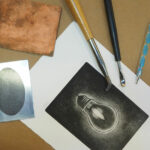
Burnished aquatint is an intaglio technique that speeds up the execution of a black style, imitating its aesthetic characteristics and the method of processing the image. Through the work of indirect engraving of the aquatint, a rough and dark surface is generated, from which, with the use of tools such as the scraper and the burnisher, we will obtain lights and shadows with highly effective tonal results.
We will discover how to make an aquatint using the BIG and abrasive paper; we will engrave matrices with the salt mordant for copper, ferric perchloride, and we will create our images by bringing out the lights from the black matrix with careful manual work .
Photoetching with BIG ground
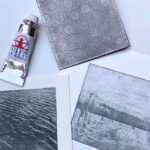
BIG (Baldwin’s Intaglio Ground) ground is a sustainable substitute for traditional etching or soft-ground inks. In addition to acting as a substitute, however, the BIG ground opens up printmaking to new technical possibilities. One of the most interesting is Photoetching, passing through a transfer process.
We will use photocopies from which we will transfer the images on metal plates, without using the ultraviolet light characteristic of photoengraving or additional products other than the simple BIG. The plates will then be engraved with copper sulphate, further processed with other techniques and printed as many times as we wish. The possibilities of this method are vast and range from the aesthetics of a pen drawing, to the reproduction of quick brush strokes, to the photographic image.
Week 2
In the second week, the participant will focus on printing the matrices created using the learned techniques. Following that, the themes of the artist’s book (Accordion Book) and binding (Japanese Binding) will be explored, with the objective of assembling all the artworks into a single-sheet artist’s book.
Roberta Feoli De Lucia
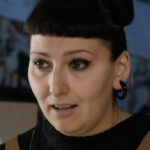 Engraver, printer, teacher, Feoli specialized in Printmaking at the Academy of Fine Arts in Urbino. She experimented with managing a print shop during her Erasmus at the Faculty of Fine Arts Alonso Cano in Granada and continued her studies at the IScuola Internazionale di Grafica in Venice, where she later became the print shop manager for about ten years. In 2018, she was a Guest Artist in the USA for Mixit Print Studio and Boston Printmakers, who invited her to give lectures to American universities and print shops. She also became the first Italian printmaker to obtain a specialization in less toxic printmaking techniques at Zea Mays Printmaking in Florence (Northampton), Massachusetts. She currently collaborates and serves as an external consultant for the Shepherd & Maudsleigh Studio in West Newton, Massachusetts.
Engraver, printer, teacher, Feoli specialized in Printmaking at the Academy of Fine Arts in Urbino. She experimented with managing a print shop during her Erasmus at the Faculty of Fine Arts Alonso Cano in Granada and continued her studies at the IScuola Internazionale di Grafica in Venice, where she later became the print shop manager for about ten years. In 2018, she was a Guest Artist in the USA for Mixit Print Studio and Boston Printmakers, who invited her to give lectures to American universities and print shops. She also became the first Italian printmaker to obtain a specialization in less toxic printmaking techniques at Zea Mays Printmaking in Florence (Northampton), Massachusetts. She currently collaborates and serves as an external consultant for the Shepherd & Maudsleigh Studio in West Newton, Massachusetts.
In 2023, she partnered with Silvana Gaspari on the project “Charta picta – Opificio d’arte 2023,” an artist residency, traveling exhibition, and workshops related to the Vas Paper Mill. A member of the “People of Print” community, she is an active supporter of respectful and sustainable printing, organizing courses and conferences on the subject for years.
Franco Vecchiet
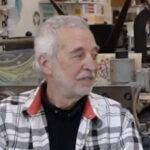 Born in Trieste, Vecchiet studied in Urbino, at the Academy of Ljubljana, and with H. Goetz in Venice. Until the 1980s, he primarily dedicated himself to printmaking, later adding painting to his repertoire and experimenting with artist books and installations.
Born in Trieste, Vecchiet studied in Urbino, at the Academy of Ljubljana, and with H. Goetz in Venice. Until the 1980s, he primarily dedicated himself to printmaking, later adding painting to his repertoire and experimenting with artist books and installations.
He directed the School of Etching “Carlo Sbisà” in Trieste, and in 1999, he was invited to teach at the Higher Academy of Art in Paris. Subsequently, in 2009, he taught at Indiana University in the United States. He has curated over seventy solo exhibitions in various cities in Italy and abroad, participating in international exhibitions and biennials. In 1989, he was awarded the national Preseren Fund Prize in Ljubljana, and in 2004, he won the international competition for the mosaic on Transalpina Square in Gorizia. In 2006, he received the special jury prize at the Ex Tempore in Piran (Slovenia). In 2008, he was honored with the “Homage to Spacal” award for painting organized by the Kons association, and in 2012, he received the SKGZ recognition in Trieste for his artistic activity. In 2009, he was awarded the Grand Prix at the International Print Biennial in Sarcelles, Paris. In 2014, he was the protagonist of a personal retrospective exhibition at the Revoltella Museum of Modern Art in Trieste.
Matilde Dolcetti
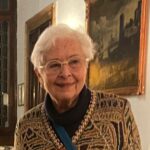 A Venetian artist, the soul, and curator of art programs at the Scuola Internazionale di Grafica. Since 1980, Dolcetti has worked alongside international artists at the school’s print shop and has taught for international institutions and universities.
A Venetian artist, the soul, and curator of art programs at the Scuola Internazionale di Grafica. Since 1980, Dolcetti has worked alongside international artists at the school’s print shop and has taught for international institutions and universities.
She has conducted seminars at the Pontifical Catholic University (P.U.C.) in Rio de Janeiro, the State University of Campinas (Unicamp) in São Paulo, and later in Bremen for the Gerhard Marcks Haus Museum. Additionally, she has held seminars in Belgrade for the National Museum, in Boston at Boston University, and at Connecticut College in New London, CT, United States. She was part of the international jury for the IV Biennial of Art Graphics in Belgrade and was an Artist in Residence at the University of Iowa in Iowa City, IA, United States. She has had the opportunity to collaborate with masters such as Stanley William Hayter, Riccardo Licata, Jean M. Granier, Bruno Munari, Maria Lai, and Michael Mazur.
She has also participated in prestigious group exhibitions at the École Supérieure des Beaux Arts in Paris, the IX International Print Biennial in New London, CT (United States), and in 2022, she has been part of “Acqua è il mio colore / Water is my colour,” an exhibition celebrating the works of six artists who have been central to the world of watercolor at the Scuola Internazionale di Grafica in Venice.
Alessia De Bortoli
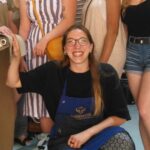 Engraver, printer, and book artist, De Bortoli graduated from the Academy of Fine Arts in Venice, where she obtained a bachelor’s degree in Printmaking. She continued her studies at the Scuola Internazionale di Grafica, following the teachings of the Scuola’s Masters: Matilde Dolcetti, Roberta Feoli, Franco Vecchiet, Loretta Cappanera, and international artists periodically present at the institution. Since 2019, she has been working in the print shop of the Scuola, initially as an assistant, then as the print shop manager and teacher of courses.
Engraver, printer, and book artist, De Bortoli graduated from the Academy of Fine Arts in Venice, where she obtained a bachelor’s degree in Printmaking. She continued her studies at the Scuola Internazionale di Grafica, following the teachings of the Scuola’s Masters: Matilde Dolcetti, Roberta Feoli, Franco Vecchiet, Loretta Cappanera, and international artists periodically present at the institution. Since 2019, she has been working in the print shop of the Scuola, initially as an assistant, then as the print shop manager and teacher of courses.
From 2018, she has participated in group exhibitions in Italy and abroad. Since 2019, she has particiipated in artist residencies in Germany at the Kloster Bentlage center in collaboration with the Münsterland Festival. Subsequently, in 2022, she completed a residency in the USA at the Zea Mays Printmaking studio, where she earned the “Green Printmaking certificate” for sustainable intaglio engraving methods.
She has taken part in various group exhibitions, including the VI Biennial of Engraving and Contemporary Graphics at the Civic Museums of Bassano del Grappa, the exhibition “Water – Works on Paper” at the Artery Cooperative in Northcote, Australia, and “Changing Landscapes – Paesaggi che cambiano,” organized by DARS for GrabGroup space in Pordenone.
Upon completion of the course, participants will receive a certificate of attendance. Upon request, they may also receive the Europass Mobility Certificate. These certificates adhere to Erasmus Quality Standards and provide a brief description of the course, its learning outcomes, dates, venues, the course provider’s name, and the course teachers.
Terms of Participation in the Erasmus+ Professional Developement Courses at Scuola Internazionale di Grafica
- This Programme is offered to a maximum of 3 participants. Enrollments are accepted on a first-come, first-served basis.
- To enroll in the Programme, participants are required to fill out the registration form available on the Scuola’s website.
- Participants are requested to ensure that the provided information is correct. Any changes to the registration information must be promptly emailed to the Scuola at info@scuolagrafica.it.
- Invoice:
Upon acceptance into the Programme, the Scuola will issue an electronic invoice to the institution funding the participant or directly to the participant if not funded by any institution. - Registration:
To confirm participation in the 5/10 Day Programme and secure an available spot, participants are requested to pay a €200,00 registration fee upon acceptance by the Scuola. This fee is non-refundable. Balance fees are due no later than 15 calendar days from the start of the programme. - Payments:
Fees can be paid through bank transfer or securely via credit card payment on the Scuola’s online shop→ - Cancellation & Refund Policies:
The Scuola reserves the right to cancel the programme due to unforeseen circumstances. In such instances, participants will receive a full refund.
The Scuola bears no responsibility for any inability or delay in fulfilling obligations arising from circumstances beyond its control, which may include, but are not limited to, acts of nature, war, terrorism, or government regulations. - Cancellation by the Participant:
Cancellations before 60 days from the beginning of the programme are granted a full refund of the balance fees.
Cancellations before 30 days from the beginning of the programme are granted a 50% refund of the balance fees.
Cancellation within 15 days from the beginning of the programme will not be refunded.
If the participant does not show up on the programme’s starting day, no refund will be provided.
In the event that, without having communicated their delay in writing, the participants appear on the following days after the programme has started, they will not be admitted to participate, and no refund will be issued.
Refunds, if due, will be issued within 10 days after receiving a formal cancellation email at info@scuolagrafica.it.
At its discretion, the Scuola may consider exceptions to the cancellation policy in instances of documented emergencies or unforeseen circumstances. - Participants may request to transfer their enrollment to a future date, subject to availability and approval from the Scuola.
- For organizational reasons, the dates, instructors, and the curriculum of the programme may undergo changes. In such a case, participants will be promptly informed and, upon their request, reimbursed the entire amount of the course.
- The Scuola Internazionale di Grafica functions as both a school and studio for artists. All participants are expected to adhere to the rules provided at the beginning of each course.
- The use of presses and working tools is strictly prohibited without the supervision of our qualified staff. The Scuola is not liable for any injuries resulting from non-compliance with our rules.
- Insurance:
We recommend that participants purchase travel insurance for medical expenses, lost property, or any kind of accident occurring while travelling and during the course. - Meals are not included in the programme cost.
- Materials and Tools:
The Scuola Internazionale di Grafica provides all necessary materials and tools for the programme. - Privacy:
Participants acknowledge and accept that images of their work created at the Scuola, as well as their personal images, may be published on the Scuola’s website or social media profiles for promotional purposes. - Accreditation Erasmus+:
Participants must fulfill all programme requirements to receive a certificate of accreditation Erasmus+. - Competent Jurisdiction:
For any dispute related to these Terms of Participation, the competent jurisdiction is that of Venice. - The Scuola reserves the right to update or modify these Terms of Participation. Changes will be communicated to enrolled participants via email.
Once the course is confirmed, we will dispatch the official Learning Agreement document model, inclusive of all pertinent details regarding our courses and organization, to applicants and school coordinators. You are required to sign and stamp the document before returning it to us via email.
Please be aware that you are required to reach out to your Europass National Centre at https://europass.cedefop.europa.eu/about/national-europass-centres to acquire the Europass Mobility Model.
- Experience the Printing Revolution→
Recommended for Humanities teachers.
May 20-24 and October 14-18 - Creativity and Manual Skills in the Classroom→
Recommended for primary and secondary school art teachers.
May 20-24 and October 14-18 - Introducing Sustainable Processes in Printmaking→
Recommended for Art teachers of secondary art schools, academies, and art universities.
May 27-31 and October 21-25 - Erasmus Plus Independent Mobility→
1 or 2 Week Individual work and research for professors with experience in Printmaking.
Dates open
